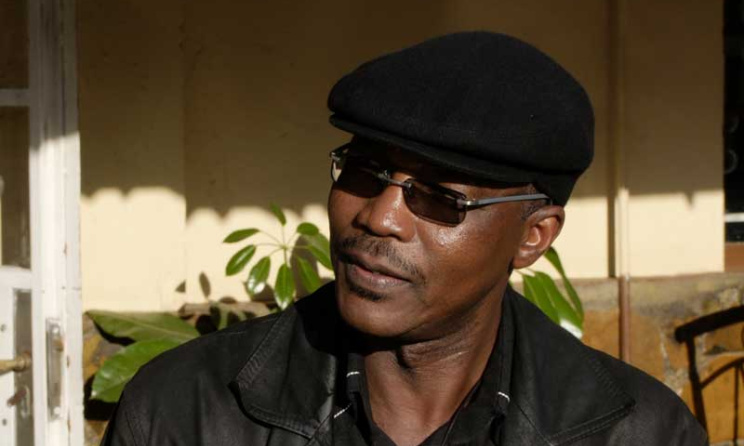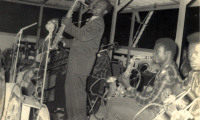Tabu Osusa: Crusader for the roots
By Stanley Gazemba
As Kenya’s contemporary musicians grapple with the pursuit of a distinctly Kenyan musical identity they may need to pause and look back at the past. That is where the key to this still nebulous identity lies. At least that’s what veteran producer Tabu Osusa thinks.
 Ketebul Music's Tabu Osusa
Ketebul Music's Tabu Osusa
In an interview at his office at Ketebul Music studio at The GoDown, Tabu says the only way young musicians will secure a distinctive identity is by embracing traditional music. “East Africans have an identity issue,” he said. “It is because there’s a disconnect between traditional music and contemporary music. Other people take their traditional music and work on it to contemporize it while Kenyans take the easy way out.”
According to him, every serious musician first needs to study and understand the basics of making music before he or she decides on the genre they want to pursue. And by ‘studying’ he doesn’t mean formal music lessons like those offered at the Kenya Conservatoire of Music. Actually he frowns on that type of music instruction. His idea of classes is for the young musicians to attach themselves as apprentices to experienced older musicians so that they can be tutored.
“African music is never taught in class. Africans learn their music by the ear. The music doesn’t need to be written. The best musicians like Franco (of TPOK Jazz) never attended any music classes. And yet they can go to Europe and teach a university class to play music.”
He cites Congolese and West African musicians as the best case studies. “If you play Congolese music you don’t need to be convinced that you are listening to Congolese music. You will know that it is Congolese. The same with West African and South African. There’s something in the music, no matter how modern, that makes it South African. It is that unique thing that contemporary Kenyan musicians need to put in their music. I listen to a lot of modern gospel music and laugh. Apart from the lyrics, which are Kalenjin, Kikuyu or whatever, the arrangement is completely South African!”
Tabu admits that he has no problem with hip-hop, which is influencing most of the recorded urban music at the moment. He actually loves hip-hop, but he cautions young hip-hop musicians against playing it the way Americans do and then trying to pass it off as their own. “It is good to borrow, but the music must retain a main ingredient from your culture,” he said. “South Africans play jazz, but they play it in a South African way, not American.”
He would rather the upcoming musicians found a way to work traditional Kenyan musical arrangements into their hip-hop. That way they can perform in front of an American audience and not be booed off the stage because the audience will be hearing something different in the music, even if done in the hip-hop style. “Hip-hop artists in the West base their music on old music. If you listen carefully to Kanye West, Jay Z and the rest of them you will hear traces of older musicians like Otis Redding. It is this familiar sound that makes them succeed with the audience. The music isn’t completely new.”
Tabu has a bone to pick with the government and the media regarding Kenyan music. “The main problem with Kenyan music is the government and the media. They haven’t put in place conditions that are conducive to the development of Kenyan music. The media has grouped traditional musicians together and shut them out at the expense of western music. If we could see the old music visible in the media, then the young guys could say, ‘Oh, this is good.’ Otherwise as it is, Kenyans sound like everyone else rather than like themselves.”
According to him this negative attitude towards traditional music plays out in the live music scene. “The musicians who know cultural music are culturally literate but musically illiterate, and vice versa.”
Even with rapid urbanization Tabu believes at the heart of every town-dweller is a desire to stay attached to his culture. He cites the example of Ronalo K’Osewe, a popular restaurant serving traditional fare on Kimathi Street in Nairobi and the hugely popular ‘cultural nites’ at The Carnivore restaurant where city residents go to savor traditional brews and food as they dance to cultural music. He believes this points to the deep-seated desire of urbanized people to touch base with their culture.
“Now we know that Kenyans love African food, so lots of restaurants are taking after K’Osewe. We’ve also realized Kenyans love traditional music, and everyone is rushing to ape. The problem is we don’t know that there are genres. Also there is a problem with the traditional musicians. Most of them are musically illiterate.”
He cites Ayub Ogada, who has successfully exported traditional music to Europe, and who could never be mistaken for a European. He also cites the example of Miriam Makeba who avoided going to a conservatoire school because her father couldn’t afford the fees. “She probably would never have made the music she made if she had gone through formal school.”
Tabu would like the government to recognize that there is a problem at the cultural level and would like traditional music to be introduced in the school curriculum. Although he never received formal musical schooling himself, he has a load of experience. He was a founder member and manager of the Samba Mapangala-led Orchestre Virunga and has worked with a wide range of musicians mostly as a producer-manager. He is involved in a number of musical projects, among them the Alliance Francaise’s Spotlight on Kenyan Music and Singing Wells, a project that is mapping East African music.
His parting shot: “It isn’t how good you are, but how different you are.”





















Comments
Log in or register to post comments